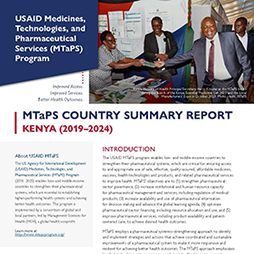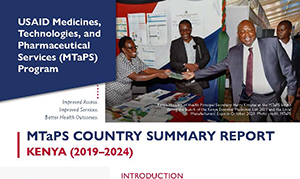MTaPS' Support
By supporting the implementation of Kenya’s National Policy and Action Plan for Prevention and Containment of Antimicrobial Resistance (2017–2022), MTaPS is helping the country improve infection prevention and control (IPC), optimize the use of antimicrobial medicines, and strengthen multisectoral coordination for containing antimicrobial resistance (AMR).
MTaPS focuses on the following technical areas:
Effective coordination
In line with the World Health Organization’s (WHO) One Health approach, MTaPS aims to improve coordination among the human, animal, and agricultural sectors as well as their shared environment. Activities include strengthening the capacity of the National Antimicrobial Stewardship Interagency Committee (NASIC), which is the leadership, governance, and oversight body for One Health implementation in Kenya, and developing a communique to sensitize high-level officials and other stakeholders on the threat of AMR. Activities also include helping NASIC’s technical working groups to develop terms of reference and action plans.
Infection Prevention and Control
MTaPS uses a systems approach to develop sustainable institutional and human resource capacity at the facility, sub-county, and national levels to improve infection prevention and control (IPC) practices. Activities include strengthening collaboration between IPC and quality improvement teams at the facility level to drive best practices and helping counties conduct training-of-trainer workshops that incorporate IPC audits at selected hospitals so that health care workers are better able to prevent and manage health care-acquired infections.
Strengthening Antimicrobial Stewardship
Antimicrobial Stewardship Governance
Promoting sound antimicrobial stewardship (AMS) at the point of care will contribute to the achievement of desired health outcomes by preserving the effectiveness of antimicrobials and decreasing inappropriate use. MTaPS is supporting the Ministry of Health and partners in finalizing and launching AMS guidelines. Follow-on activities include assisting selected counties to introduce the guidelines and supporting their implementation in Kenyatta National Teaching and Referral Hospital and Gertrude’s Children’s Hospital to help curb AMR and build their capacity to function as learning and mentoring facilities. Additionally, MTaPS will work with stakeholders to revise the Kenya Essential Medicines List and classify antibiotics according to the WHO Access, Watch and Reserve (AWaRe) categories, which will form the foundation for monitoring antibiotic use.
In-service re-licensure-linked continuing professional development
Linking in-service courses to continuing professional development (CPD) credits and re-licensure is an effective and sustainable approach that incentivizes health care professionals to attend trainings and apply acquired skills in their practice. MTaPS is collaborating with professional organizations, councils, and stakeholders to package a CPD in-service training course that highlights the importance of the One Health approach for strengthening IPC and AMS.
Pre-service training on AMS
Pre-service training helps prepare pharmacy students to prevent and manage AMR in health care settings and are likely to be more sustainable than in-serving training alone. MTaPS is supporting the University of Nairobi’s School of Pharmacy in reforming its pre-service curriculum to integrate AMS-related topics of practical importance.






